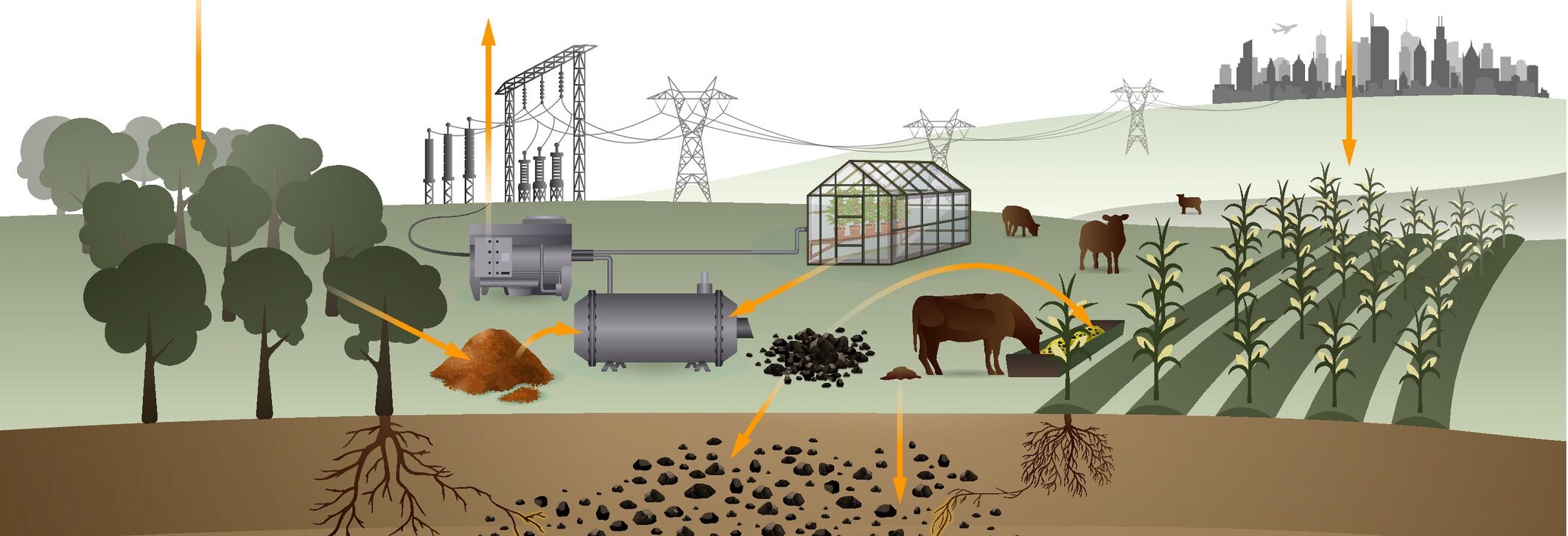What is biochar and what is it used for?
Biochar is the product of heating various types of biomass in the absence of oxygen. Various organic materials, such as branches, chips, agricultural residues, waste, and even sewage sludge can be used as feedstock for producing biochar.
Biochar is a carbon-rich material that can significantly improve soil fertility and health, especially in inherently infertile soils. Some of the benefits of biochar include improving the soil’s water and nutrient retention capacity, reducing soil acidity, sequestering unwanted pollutants, and supporting beneficial soil biology (by promoting humus formation).
Biochar can remain in the soil for centuries. Civilizations living along the Amazon river have long known about this technique and have mixed biochar with poor-quality tropical soils to create Terra Preta (“black soil”), which has resulted in highly fertile soil that remains productive to this day (with long-lasting effects).
From an environmental perspective, it is important to know that by producing biochar, we extract carbon dioxide (CO2) from the atmosphere and store it in the form of carbon and organic matter (humus) in the soil.
Why does biochar work?
The beneficial properties of biochar arise from its physical and chemical characteristics.
The structure of biochar:
Biochar is typically of plant origin, with a porous structure and an extremely large surface area. One gram of biochar has a surface area of approximately 2000 square meters. This allows biochar to absorb large amounts of water and nutrients. Biochar is a lightweight and low-density material that improves soil structure and reduces compaction (soil loosening).
The chemical structure of biochar:
Biochar is primarily composed of cyclic carbon atoms, which are tightly bound together to form an extremely stable structure that prevents carbon from escaping into the atmosphere as CO2. (Some studies have identified carbon in Terra Preta that was formed 500-7000 years ago.)
A fortunate property of biochar is that its surface is negatively charged, allowing the material to bind positively charged chemical compounds such as nutrients or even pollutants. Along with its large surface area, this property contributes to its high “cation exchange” capacity. This helps the plant access more nutrients (potassium, calcium, ammonium).
How can biochar improve soil health?
The physical and chemical structure of biochar makes it useful in agriculture in a variety of ways. The same properties that make biochar a soil amendment also make it effective at retaining water. Some typical areas of biochar use include:
- Biochar increases nutrient and water retention in soil
Biochar can absorb and retain nutrients such as potassium and calcium, preventing them from leaching out of the soil and making them more available to plants. While this property is especially beneficial for low-nutrient or low-organic matter soils, better nutrient retention reduces fertilizer use and the release of fertilizers into the environment, reducing fertilizer costs while improving plant yield. Additionally, biochar’s high porosity makes it able to retain soil water, which can be particularly useful in areas with little precipitation, where irrigation may be expensive, or on soils with poor water-holding capacity such as sandy or gravelly soils.
- Biochar provides a beneficial habitat for soil biology
The porous structure of biochar provides a safe and spacious living space for beneficial microbes that contribute to soil health, protecting them from harmful soil conditions while providing the nutrients they need to reproduce. Increasing soil biological diversity increases the humus content of the soil, which ultimately increases its productivity and economic value.
- Biochar can moderate soil acidity
Due to its negative surface charge, biochar can bind hydrogen ions (protons) present in soil, reducing soil acidity (raising the pH). Increasing the soil pH reduces the level of potentially toxic metals, such as aluminum, that may dissolve in acidic environments and affect plant growth. These harmful metal ions can also bind to biochar, further reducing their concentration in the soil.
- Biochar can disinfect soil and water
In addition to its soil-amending properties, biochar is excellent for reducing soil toxicity (bioremediation). Biochar can bind heavy metals such as lead and cadmium, preventing plants from taking them up, and can also bind unwanted chemicals in the soil. This is particularly useful for contaminated soils that may contain higher concentrations of heavy metals. Biochar can also be used to treat water, as it can bind harmful organic molecules and disinfectant residues.
- Biochar can improve soil physical properties
Because biochar has low density and high surface area, it can improve soil texture and structure, resulting in better drainage, improved soil aeration, and enhanced root growth. Overall, biochar is a versatile soil amendment that can contribute to sustainable agriculture, increase soil health and productivity, and reduce environmental pollution.

